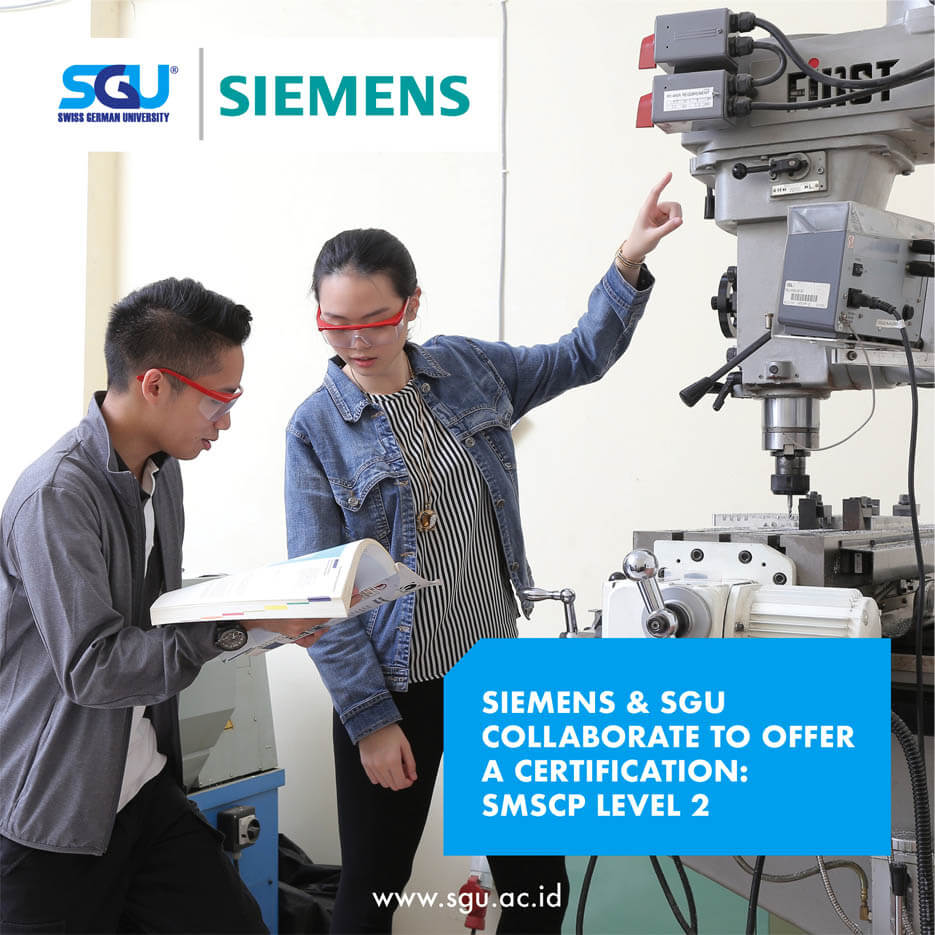
Siemens & SGU Collaborate to Offer a Certification: SMSCP Level 2
In 2011, Germany began to introduce the term Industry 4.0 to the world. Industry 4.0 is an industry marked by the increasing involvement of advanced data and technology. Cooperation between humans, machines and other resources will be increasingly side by side. In the future, many industries will prioritize computerization, smart factories, and automation. Later, there will be many innovative products, services, and processes in the Industry 4.0 era.
Example of the implementation of Industry 4.0:
In the past, we used human power to move products around the factory. Now, in advanced industries, it is common to use Automated Guided Vehicle (AGV). This is a robot that is developed to move and arrange things where they belong in the factory. We can control the vehicle, while ensuring the stability of the vehicle while it is running and increasing the operating speed to increase productivity.
In everyday life in Indonesia, we can also find the application of Industry 4.0. One example is the smart parking system. In the past, when we wanted to leave the mall or office building, we had to queue at the exit because we were waiting for changes or other conventional obstacles. There was also a parking attendant who collected our parking tickets and we had to pay in cash. Over time, many parking providers began to switch to using more sophisticated technology. You can download the parking application, then scan the parking ticket through the application and make payments using the e-wallet or e-money method. If you don’t have the application, you can take advantage of the Automatic Payment Station (APS) technology. You just need to scan the ticket when exiting the parking area. After successfully scanning, the next step is to tap electronic money from the bank you have. Now, the entire parking payment process is fully automated, cashless, does not have to be guarded by parking attendants anymore, and of course there is no need to queue anymore.
Industry 4.0 will slowly become a matter of concern for developing countries like Indonesia. We need to adapt to get there. To reach this point, of course, collaborative steps are needed from the government, industry players, and the involvement of academics who jointly prepare a path for Industry 4.0 and its implementation to be increasingly recognized, as well as many human resources who have been prepared for these changes.
SGU Mechatronics Equips All Graduates with Siemens Mechatronic System Certification Program (SMSCP)
SGU as the first international university in Indonesia certainly helps ensure that its students are sensitive to changes at the international level. In response to this, SGU Mechatronics is working with PT Siemens Indonesia to provide the education standards needed.
Siemens is a German multinational conglomerate company headquartered in Munich and the largest industrial manufacturing company in Europe with branch offices abroad. Siemens itself is an industry leader in the electrification, automation and digitization industries. Since 2014, Siemens President Director and CEO PT Siemens Indonesia Prakash Chandran has emphasized the mission and commitment of Siemens to help improve human resources, especially in Indonesia.
Siemens is now collaborating with SGU Mechatronics through teaching programs that meet the quality standards of Siemens’ work processes and summarized in the Siemens Mechatronic System Certification Program (SMSCP). This program is the most prestigious certification program in the world related to the initiation of the Industry 4.0 era. As one of the companies from Germany that plays a major role in the industry, Siemens certifies and partners with various educational institutions that have spread throughout the world. The training from the SMSCP is implemented in the curriculum for four years of studying at SGU.
Read More:
SGU is the first institution in Indonesia to receive a level 2 SMSCP training program. Every student who studies mechatronics in SGU will be presented with a training method by studying an industrial tool module, then learning deeply about various components, then implementing these practical activities with theory.
Head of Mechatronics SGU, Leonard P. Rusli, B.Sc, M.Sc, Ph.D, said that with the certification, SGU graduates have competency advantages to enter the professional world. “Our alumni are certainly more excellent, because they are all equipped with an international level 2 certificate, which is officially validated by this industry leader. Our graduates will become a better prepared workforce because the lessons they learn during their study at SGU will follow industry-level standards. SGU students may also find it easier to get career opportunities in Germany, because they also have internships and theses there. This international certification allows them to have a career not only in Indonesia, but also abroad,” he said.
Studying Mechatronics in SGU is the best way to prepare yourself to be an excellent and well-balanced engineer. Starting from the new academic year 2020, each graduate of SGU Mechatronics will get the SMSCP certification. If you are interested in studying mechatronics in Indonesia, SGU is the right place for you, because we provide academics which follow industry-level standards. Don’t hesitate to contact our consultant and find out more.
Tentang SGU
SWISS GERMAN UNIVERSITY (SGU) is an international university in Indonesia, was established in 2000 as a joint effort between Indonesia, Germany, Switzerland, and Austria. We are the pioneer in offering international curricula in Indonesia. Qualified students can graduate with a Double Degree from Indonesia and Germany, which SGU provides in cooperation with partner universities; surely a valuable tool for your future careers. Ever since its establishment, SGU has been dedicated to delivering quality education in line with international standards and aims to develop skilled professionals who meet the demands of the industry. In order to achieve its objectives, SGU offers quality-oriented learning through 12 Bachelor’s Degree Programs and 4 Master’s Degree Programs ranging from Engineering, Information Technology, and Business to Life Sciences and Social Sciences. Furthermore, with small class sizes, and with English as the medium of instruction, you can look forward to pursuing your tertiary education and degree with full confidence.
Back
